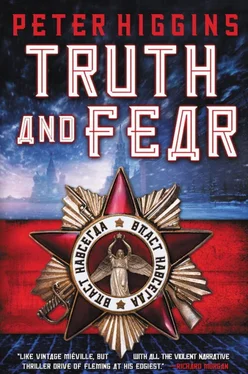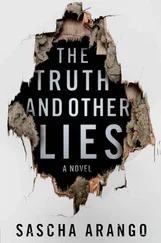‘Many years ago,’ said Ilinca. ‘She would have been the age you are now, perhaps, or younger. Then she married that hothead Kantor boy, and when he was sent to Vig she went with him. She came back of course, but not here, not back among her friends here in the raion.’
‘A disaster!’ said the Count. ‘A catastrophe for Lezarye. We should not have left her so. We should have gone to her. We should have reached out. Insisted. I am ashamed. For myself and for all of us, I am ashamed.’
‘And then…’ said Ilinca. ‘We heard she was killed.’
‘Yes,’ said Maroussia. ‘She was.’
‘I am so sorry,’ said Ilinca. ‘So sorry.’
‘But this is a gift ,’ said the Count. ‘Your coming here now, it is a sign . The times darken, but opportunity comes.’
Maroussia frowned. ‘I’m sorry,’ she said. ‘I don’t—’
‘Sandu!’ said Ilinca. ‘Leave the poor girl alone. Come and sit with me, Maroussia. Let’s have tea. It is almost time for the broadcast.’
‘But Vissarion Yppolitovich must have coffee!’ said the Count. ‘I promised him some of my coffee!’
‘Tea’s fine,’ said Lom.
‘Coffee,’ said the Count. ‘I will have some also. Ilinca, stay here. Talk to our guests.’ He hustled out to fetch it.
Lom left Maroussia and Elena with the Countess Ilinca and wandered across to the window. Columns of thick black smoke on the skyline. A sudden dizzy unreality obscured his view of the raion. Could it really be that the war had come to Mirgorod? For a decade, for most of his adult life, war had been distant. Elsewhere. The Vlast at war was a permanent condition, the symptoms of which were glimpses of veterans and conscripts on the streets and accounts in newspapers of campaigns and salients across a geography that existed only on maps. War was background noise: you knew it was there, but only if you listened for it. Most of the time, unnoticed, it affected the taste and tone of things. Somewhere beneath consciousness it grew like a slow tumour and stained the world, an unease, a discomfort, but ignorable, and you carried on from day to day as if it was not there. Until, suddenly, between moment and moment, like a fist in the face, like a train crash in the night, bombs fell out of the sky. Buildings fell and burned. Everything changed.
Lom turned away from the window. Not wanting to join the murmuring conversation around the tea things, he prowled the room restlessly. It was a museum. There was a Kurzweiler baby grand piano in the corner. Its lid was down and crowded with framed photographs of officers in shakos and pelisses, guests at balls and shooting parties, a boy who might have been the young Count Palffy in a carriage. On the sideboard there was a rack of smoking-pipes on display and a collection of silver cigarette cases, all engraved with coats of arms and monograms. Lom drifted across to the bookcase. It was filled with directories, almanacs, bound volumes of the poets of the Silver Age. He picked one out. The pages were drilled through by insects.
But the coffee when it came was everything Count Palffy said it would be. Hot and bitter and strong, in a fine blue china mug. And sugar, dark brown and sticky in a matching lidded bowl. The mug was identical to one he’d seen Raku Vishnik drink from in his apartment. Before he was dead. It seemed a lifetime ago: another world, where Raku Vishnik was not dead and war had not come.
Time in Mirgorod, Lom realised, would for ever now be counted by the coming of war. Ah, that was before the war , people in the city would say, and, Since the war… If there was an after the war . That was a new thought, possible only now. Nothing endured for ever. Not even Mirgorod. Not even the Vlast. Past and future were dissolving out of the city, leaving only a raw and shocking perpetual now. Ever since he had come to Mirgorod, Lom had felt the presence of other possibilities, other futures, drifting in the alleys: hints and glimpses, scraps of mist and half-heard voices. But now, he felt, all that was suddenly burned away, bleached out in a shocking sunburst glare. Everything was old and everything was new. It was vertiginous and horrifying. It was–he realised with a start of surprise– exciting . It was a promise . The vicious promise of war. The clock and the calendar reset to zero. Everything begins again, thought Lom. Everything starts here.
The Count offered him a cigarette.
‘No,’ said Lom. ‘No thanks.’
‘Well, I will smoke,’ said the Count. ‘Permit me.’ He took Lom by the elbow and steered him across the room. ‘Let us men stand over here with our coffee and our talk, and I will smoke. Ilinca disapproves, you see.’ He lit a cigarette and inhaled it deeply, with satisfaction.
Count Palffy talked and Lom let him. Beneath the surface politesse, Palffy was agitated. Over-animated. Rambling. He talked without direction of neighbours in the raion and other people he had known in other places long ago. Balls and duels and amours. He pointed to photographs on the walls.
‘Ah. Yes. Now that is Amah. The Graefin Blegvad. Eight thousand acres in the Konopy Hills. Her great-grandfather was ambassador to the Feuilleton Court of Oaks. Did you know, the wolf’s head in their crest was awarded for some hunting exploit or other with the Bazharev Ride? She married a Tsyprian. He was the Archduke’s second when he duelled with the Mameluke and he was wounded himself, in the leg. An idiot, of course, but he had the most comfortable kastely in all of the south Hertzbergen. Part of the Detlevsk oblast now, more’s the pity. A military college. Such a waste.’
Count Palffy talked on. His world had gone fifty, a hundred years ago, but the Count was in it still, despite, or perhaps because of, the fact that the city around them was burning and war had come. Lom, only half-listening, found they had somehow moved on to lepidoptery.
‘I’m something of a collector,’ the Count was saying. He led Lom over to examine display cases mounted on the walls. Moths and butterflies and beetles, some drab, some gaudy, some as large as Lom’s palm, others so small you could hardly see them. All labelled in a clear and careful hand. ‘My specialism is winter moths. Ice moths. Strategies for surviving the deep winter cold. It’s a fascinating area. You know about this, perhaps?’
‘I’ve never thought about it. I assumed they laid their eggs and then they died.’
‘That is the common strategy, Vissarion Yppolitovich, of course. But there are some–like this one, you see, this shoddy-looking fellow here, this Faded Birchmoth–now, he survives the winter by allowing himself to become frozen solid. But only externally. He prepares himself for the temperature drop by excreting all the water in his body. His internal fluids become extremely concentrated. They resist freezing inside. You see the brilliance of this? Dead on the outside, alive within. He endures! He can survive temperatures as low as minus forty. More. And for months at a time. His wings blacken and drop off, of course. But he grows fresh wings in the spring.’
‘We’re not talking only about moths here, are we?’ said Lom.
The Count looked at him sharply.
‘Of course not, man.’
‘Sandu!’ Ilinca called from the other side of the room. ‘The radio. It’s starting.’
The clock on the mantelpiece showed seven minutes past four. It was growing darker outside, though the curtains were not yet drawn. Early winter twilight. Palffy went across to turn the volume knob higher.
‘Citizens of Mirgorod! Prepare yourselves for an important announcement!’
‘Ah!’ he said. ‘Now we have it.’
‘Citizens,’ Fohn’s unfamiliar voice began. ‘Comrades. Friends. The Great Patriotic War has come to our city.’ He started to speak of fronts and salients. Unexpected advances. The fall of southern cities. The sinking of ships. He spoke hesitantly. He sounded out of breath, baffled and hurt. Lom struggled to follow what he was saying. And then, suddenly and it seemed too soon, he was finishing. ‘This afternoon I have given our commanders new orders. The enemy’s air force is to be smashed. Their armies annihilated. We will defend our beloved city. General Rizhin will lead the counter-attack. Our cause is good. We are ratified by the angels. The enemy will be defeated all along the line and victory will be ours.’
Читать дальше


![Кэмерон Доки - Правда и ее последствия[Truth and Consequences]](/books/79610/kemeron-doki-pravda-i-ee-posledstviya-truth-and-con-thumb.webp)









